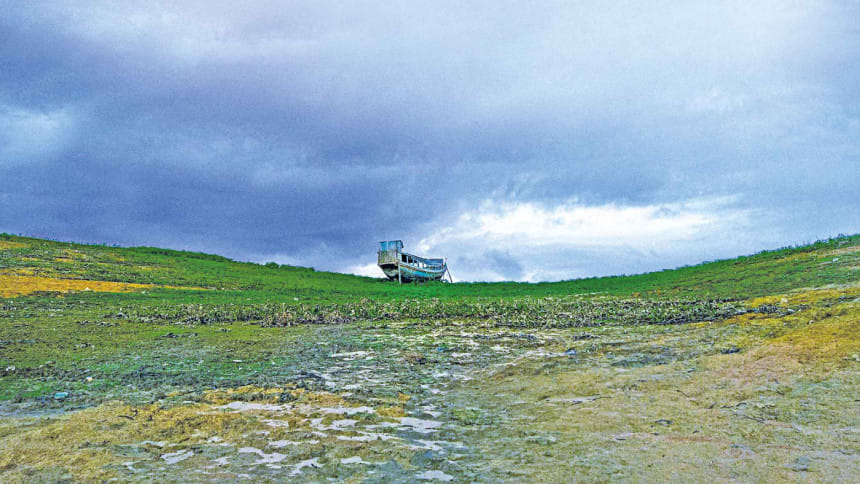Washed Away

He stood alone, motionless.
The fathomless rows of turbulent waves stretched out before him were coming closer, roaring and thrashing like a monster about to devour everything. He had to move, he wanted to move, but he stood his ground, watching as waves built up speed and height from far out in the river until the peaks rose high over his head and the land beneath him gave way. He screamed, but his voice was swallowed up by the roaring waves.
Abdul woke up, jolting out of his nightmare. He was drenched. At first, he thought he'd really drowned, then realised he was bathed in his own sweat. He looked around. His younger sister Tuni was asleep beside him, mouth agape, limbs outstretched, followed by his parents. Abdul sighed in relief. Not yet, he thought.
Ever since birth, Abdul has known three things: his parents, the small, shabby house where he's lived his entire life, and the Jamuna. For the people of Dighipara, a small village cradled by the Jamuna, the river was as indispensable in their lives as their own breath. The river provided their livelihood, made their lands fertile, and their lives prosperous. But in monsoon, the calm and generous river shifted to a ravenous and destructive form. It soared up enormously, flooding the banks and gobbling up acres of land, including everything on it. Like everyone in the village, Abdul was well-acquainted with the myriad of dangers hidden along the smooth, seductive curves of the Jamuna. The river took away as much as it gave, sometimes it took more.
In the short span of his life, Abdul witnessed the river swallow many houses, depriving many people of their only possessions. He saw many people mourn the loss of their loved ones. Every year during the flood, he watched the entire village submerge in water while people sheltered on rooftops and high structures for days, sometimes weeks. Every year, Abdul saw the river draw nearer to his house. Once he'd asked his father, "Abba, does the river have legs like us?"
"Silly boy! Of course not. The river is not a living thing."
"But how does it come closer to our house every year?"
His father had stared at him blankly, his expression filled with sadness. "It's our fate," had been his short reply.
Abdul didn't understand then. But he understood now, when their own house was on the verge of collapse, the river being less than ten steps away. The Jamuna was their fate. Everything in their lives was as short-lasting as the ebb and flow of rivers, including the land on which they lived.
The next morning, Abdul and Tuni looked on as their father, along with other villagers, started to take down their house. The tin roofs were taken down first, followed by the iron sheets on windows and doors. They didn't have much. In a few hours, their house would turn into a heap of old, worn out scrap metal and furniture. The things would be moved, but the place where Abdul had lived, slept, and dreamt for the past seven years of his life, would stay behind. He looked at his sister.
Tuni, who was weeping silently. He had no words to soothe her, no way to stop the inevitable. Abdul started to run. Before he knew, he was standing in front of his school. Once what was his school now stood like a dead skeleton of pillars and columns, bereft of the roof, bereft of the walls, and the children whose joy and laughter once reverberated throughout the school. Soon the remnants would crumble into the river. For hundreds of children like Abdul, their only place of learning was gone. Abdul had nowhere to go. Everywhere he looked, he only saw the plight of people due to flood and erosion. The river had turned their village into a land of broken hope, homes, and happiness.
By the time the sun tilted towards the western sky, painting the sky in bright shades of auburn and orange, the river had edged dangerously close to his house. To Abdul, the good times seemed like a faraway memory, almost unreal, like a shadowy dream in the middle of the night. The times Abdul spent in the lap of the river, playing on its shore, swimming in its silvery water, fishing and diving, sailing on boats and banana rafts were some of the best moments of his life. But as Abdul watched the mighty Jamuna crash violently against the shore, moving relentlessly closer to his house, or what remained of it, he could only think that the river was cruel. He wanted to shout at the river, "You're selfish. You're a monster. You give us everything only to wash it all away." He wanted to stop the river from advancing. But he was helpless, just like the rest. So, with his eyes brimming with tears, face aglow with the last sliver of twilight, Abdul watched the river wash away the remnants of his house, one wave at a time.
The writer is an HSC candidate.

 For all latest news, follow The Daily Star's Google News channel.
For all latest news, follow The Daily Star's Google News channel. 



Comments